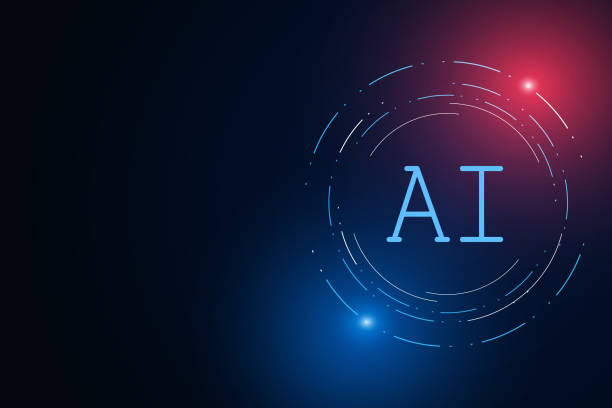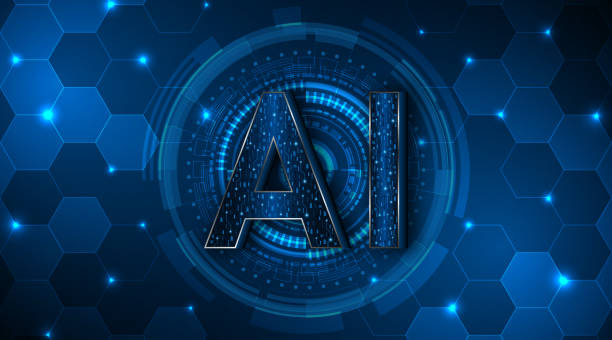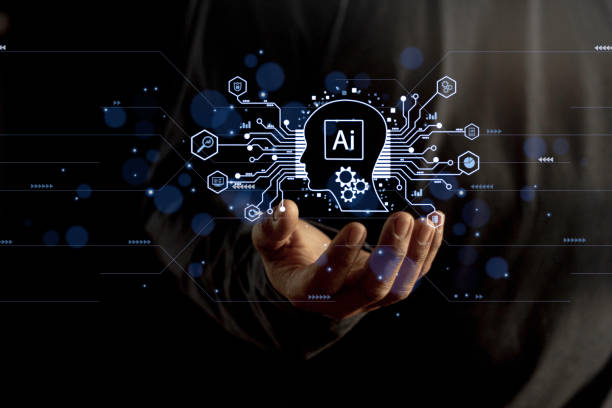Introduction to Modern UI Website Design and Its Role in Business Success

In today’s fast-paced world, an online presence is vital for any business.
But simply having a website is not enough; modern UI website design is not just a competitive advantage but an absolute necessity.
The user’s first experience with your website significantly impacts their perception of your brand.
An outdated or confusing user interface can quickly drive visitors away, while a #modern_design and #intuitive_design encourages them to stay and interact more.
This includes details such as #loading_speed, #ease_of_navigation, and #visual_appeal, all of which contribute to a positive user experience (UX).
In fact, #user_experience and #user_interface (UI) are two sides of the same coin, whose ultimate goal is to increase user satisfaction and, consequently, boost conversion rates and customer loyalty.
In this journey, the concepts of responsive design also play a vital role, as users access your content from various devices.
A website that doesn’t display well on a mobile phone easily loses a large segment of its audience.
This explanatory content introduces you to the importance of this concept.
Are you dissatisfied with your e-commerce website’s low sales?
Rasaweb is your solution for a professional and high-selling e-commerce website.
✅ Significant increase in sales and revenue
✅ Easy and enjoyable shopping experience for customers
⚡ Get a free consultation from Rasaweb now!
Key Principles of Modern UI Design and Its Impact on User Experience

To achieve modern UI website design, one must adhere to a set of principles and rules.
These principles not only contribute to visual appeal but also significantly enhance the efficiency and usability of the website.
The first and most important principle is user-centricity.
Every design decision should be made considering the needs, behaviors, and expectations of the end-user.
This approach ensures that the website is not only beautiful but also useful and usable for real users.
The second principle is simplicity and clarity.
A modern user interface avoids unnecessary complexities and presents information clearly and understandably.
Using ample white space, appropriate visual hierarchy, and intuitive navigation are among the techniques that help achieve this goal.
The third principle is consistency and uniformity.
Visual and interactive elements throughout the website should be used uniformly so that users feel familiar and comfortable.
This consistency builds user trust and helps them quickly adapt to the site’s environment.
This educational section helps you gain a better understanding of these vital principles.
Other principles such as instant feedback for user actions, accessibility for all individuals (even with physical limitations), and adaptive design for different devices, are all integral components of a modern user interface that greatly contribute to the success of any website.
Visual and Interactive Elements in Modern Website Design

Modern UI website design heavily relies on the correct selection and intelligent implementation of visual and interactive elements.
These elements not only ensure the site’s beauty but also play a key role in creating a smooth and pleasant user experience.
Typography, as one of the most important elements, can reflect brand personality and significantly enhance content readability.
Choosing appropriate fonts, font sizes, line spacing, and text colors are all vital in this regard.
Color palette is also highly important; colors can evoke specific emotions and guide users toward desired actions.
Using colors consistent with the brand’s visual identity, as well as maintaining proper contrast for improved readability, is essential.
Images and icons also play a significant role in attracting attention and conveying complex messages at a glance.
Using high-quality images and conceptual icons helps speed up user comprehension of the content.
In this specialized section, we will introduce several important elements and their impact on user experience:
| Element | Description | Impact on User Experience (UX) |
|---|---|---|
| Whitespace | Empty space between different page elements | Increased readability, reduced clutter, guides user’s eye |
| Microinteractions | Small animations and visual feedback for user actions | Increased engagement, provides feedback, enhances sense of dynamism |
| Call-to-Action (CTA) Buttons | Buttons that encourage the user to perform a specific action | Increased conversion rates, guides user along desired path |
| Navigation | System of menus and links for moving around the site | Ease of access to information, reduced user confusion |
Responsive design, which allows the website to display correctly on all types of devices (mobile, tablet, desktop), is also one of the main requirements of a modern user interface.
Ignoring this aspect means losing a large portion of users.
Advanced Tools and Technologies in Modern Website Design
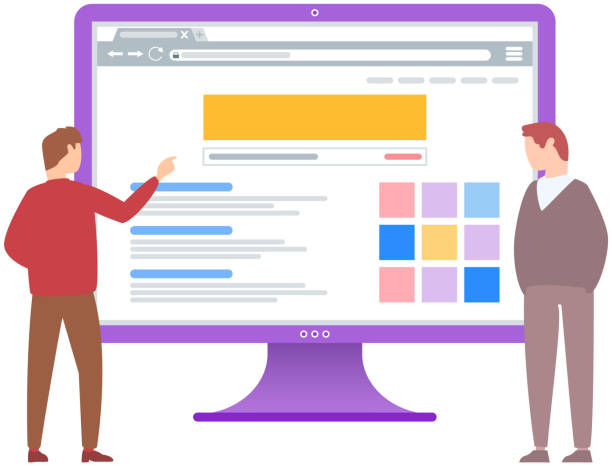
To implement modern UI website design, designers and developers require a set of advanced tools and technologies.
These tools facilitate the design process and enable the creation of more complex and interactive user experiences.
In the field of UI design, software like Figma, Sketch, and Adobe XD have become industry-standard tools.
These platforms allow for rapid design and prototyping, seamless team collaboration, and the creation of reusable components.
They enable designers to quickly transform their ideas into clickable prototypes and receive user feedback.
In the front-end development section, JavaScript frameworks such as React, Angular, and Vue.js play a central role.
These frameworks allow for building dynamic and responsive user interfaces with high performance.
Additionally, the use of Design Systems, which include a set of guidelines, standards, and reusable UI components, significantly helps maintain consistency and speed up the web development process.
This guide provides you with a comprehensive overview of the available tool ecosystem.
Do you have an online store, but your sales aren’t as expected? Rasaweb solves your problem forever with professional e-commerce website design!
✅ Significant increase in conversion rates and sales
✅ Unparalleled user experience for your customers
⚡ Click here for a free consultation with Rasaweb!
The Impact of Modern UI on User Engagement and Conversion Rates

The success of a website is not limited to its visual appeal alone, but heavily depends on its ability to attract, retain, and convert users.
This is where modern UI website design plays its role optimally.
An optimized user interface directly impacts user engagement.
When users can easily find the information they need, fill out forms effortlessly, and navigate the site through intuitive means, they gain a positive experience.
This positive experience leads to increased time spent on the site, reduced bounce rates, and more page views.
These all send positive signals to search engines, which also helps improve the site’s SEO ranking.
Beyond engagement, modern UI directly impacts conversion rates as well.
For instance, transparent and convincing Call-to-Action (CTA) button design, a simple and hassle-free checkout process in online stores, and concise and user-friendly registration forms all contribute to increasing the number of users who perform desired actions (such as purchasing, signing up, downloading).
Trust and credibility are also results of a professional and modern user interface.
A well-designed website appears trustworthy, and this sense of trust encourages users to engage more with that business.
This analytical analysis demonstrates that investing in modern UI website design will yield significant returns.
Challenges and Obstacles in Implementing Modern Website Design

Although the benefits of modern UI website design are numerous, its implementation path is not without challenges.
One of the biggest obstacles is balancing aesthetics and functionality.
Sometimes designers focus too much on visual effects and overlook the importance of usability and ease of use.
A website that is beautiful but difficult for users to interact with is doomed to fail.
Another challenge is adhering to accessibility standards.
Modern design must be usable for all users, including those with disabilities.
This requires adherence to specific guidelines that may complicate the design process.
Another point is synchronization with evolving technologies.
The world of the web is rapidly changing, and designers must constantly update their knowledge to leverage the latest tools and frameworks.
This requires continuous education and investment in resources.
User Testing is also a significant challenge.
To ensure that the user interface truly meets user needs, prototypes and initial versions of the site must be tested with real users.
This process can be time-consuming and costly, but it is essential for success.
This thought-provoking content reminds you that implementing a modern UI website design, beyond its visual aspects, requires a deep understanding of user experience and technical skills.
The Future of UI Design and Emerging Trends

The world of modern UI website design is constantly evolving, and every year we witness new trends that revolutionize the user experience.
Understanding these trends is vital for any business and web designer looking to remain competitive in the digital market.
One of the most important future trends is design for Voice User Interface (VUI) interactions.
With the expansion of voice assistants like Siri and Google Assistant, designing interfaces that users can interact with via voice is becoming increasingly important.
Augmented Reality (AR) and Virtual Reality (VR) also hold significant potential for creating fully immersive user experiences, especially in areas like e-commerce and education.
More advanced Personalization, using artificial intelligence and machine learning to provide unique content and experiences for each user, is another major trend.
This significantly helps increase user engagement and loyalty.
Smart Design, which automatically optimizes user interface elements using algorithms and data, is also emerging.
This news-worthy trend indicates that UI/UX design goes beyond mere aesthetics and moves towards intelligence and more advanced interactions.
| Trend | Description | Impact on the Future of Web |
|---|---|---|
| Dark Mode Design | Providing an option to display the user interface with a dark background | Reduced eye strain, battery saving, visual appeal |
| Kinetic Typography | Using animation and movement in text | Increased visual appeal and dynamism, attracts user attention |
| Neomorphism | A design style with subtle shadows and highlights to create depth | Soft and 3D appearance, a different experience |
| Invisible UI Design | Minimizing visual elements and focusing on natural interactions | Seamless and natural experience, extreme user-centricity |
These new trends indicate a path where modern UI website design moves towards smarter, more personalized, and less tangible experiences.
Case Studies and Successful Examples of Modern UI Website Design
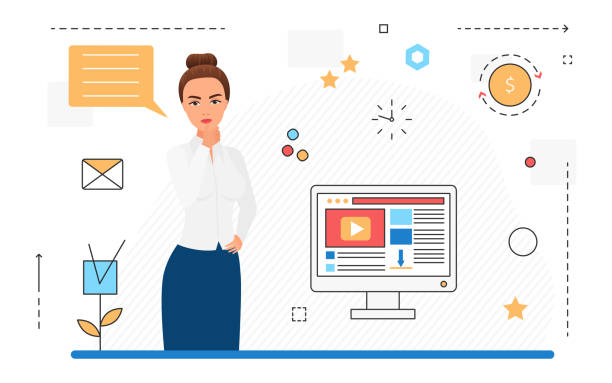
To better understand the importance of modern UI website design, examining successful examples can be very inspiring.
Leading companies worldwide invest billions of dollars in their user interface and user experience design, knowing that this directly correlates with their profitability and customer loyalty.
For example, Airbnb’s website, with its clean design, high-quality images, and extremely simple and intuitive booking process, revolutionized the tourism industry.
Its user interface allows users to easily find desired accommodations, communicate with hosts, and manage their bookings, all with minimal friction.
Another example is Google Search.
Despite the immense complexity behind the scenes, its user interface is surprisingly simple and functional.
Just a search bar and two buttons, used by billions of users worldwide daily.
This simplicity is the result of years of research and optimization.
Stripe, an online payment platform, is another example of modern UI website design that has gained a prominent position in the market by focusing on developers and the simplicity of the payment process.
Clear documentation, a clean UI for APIs, and simple registration processes have all contributed to its success.
These engaging examples show how intelligent design can bring not only beauty but also functionality and commercial success.
Do you dream of a thriving online store but don’t know where to start?
Rasaweb is your comprehensive e-commerce website design solution.
✅ Attractive and user-friendly design
✅ Increased sales and revenue⚡ Get a free consultation
The Importance of Accessibility in Modern UI Design

One of the often-overlooked but vital aspects of modern UI website design is Accessibility.
Accessibility means that your website is usable by all individuals, regardless of their abilities.
This includes people with visual, hearing, motor, or cognitive disabilities.
Ignoring this aspect is not only ethically wrong but can also lead to losing a large portion of your audience and even legal issues.
An accessible website considers this issue from the very beginning of the design and development process.
This requires adherence to standards such as WCAG (Web Content Accessibility Guidelines), published by the World Wide Web Consortium (W3C).
These guidelines include recommendations such as using appropriate color contrast for text, providing alternative text (alt text) for images, keyboard navigation capability, and designing accessible forms.
Readability with Screen Readers for visually impaired users, voice control for individuals with motor disabilities, and providing subtitles for video content are among the key measures in this area.
This specialized section reminds you that a truly modern UI website design is inclusive design that embraces everyone and provides a flawless experience for every visitor.
The Role of User Experience (UX) in Complementing User Interface (UI)

In the discussion of modern UI website design, one cannot overlook the inseparable role of User Experience (UX).
These two concepts, though distinct, are interdependent.
User Interface (UI) refers to the appearance and feel of a digital product (how it looks and how you interact with it), whereas User Experience (UX) refers to the user’s overall feeling when interacting with that product (can the user easily accomplish their tasks? Do they enjoy it?).
A beautiful UI without strong UX is like a luxurious car that is difficult and unpleasant to drive.
Conversely, an excellent UX can have a mediocre appearance, but if it is easy to use, it will be successful.
But the best scenario is when these two work in harmony.
The UX design process includes user research, creating user personas, designing user flows, and usability testing.
These steps help designers understand real user needs and design solutions that are not only aesthetically pleasing but also solve real user problems.
For example, if we consider modern UI website design for an online store, excellent UI means high-quality product images, attractive buy buttons, and a pleasant color scheme, but excellent UX means a simple and fast checkout process, comprehensive and clear product information, and easy product filtering and searching capabilities.
This analytical section emphasizes that without a comprehensive approach to UX, even the most beautiful UI cannot achieve complete success.
Frequently Asked Questions
| Row | Question | Answer |
|---|---|---|
| 1 | What does Modern UI in website design mean? | Modern UI refers to designing websites with a minimalist look, extensive use of white space, clear typography, vibrant colors or integrated palettes, subtle animations, and a focus on visual and intuitive User Experience (UX). |
| 2 | What features make a user interface “modern”? | Key features include responsive design, smooth animations, use of vectors and SVG icons, prominent typography, sufficient white space, creative layering, harmonious colors, and a focus on accessibility. |
| 3 | What is the importance of Responsive Design in modern UI? | Responsive design ensures that the website displays correctly on any device (mobile, tablet, desktop) and provides a consistent user experience, which is one of the fundamental principles of modern UI. |
| 4 | Why is the use of White Space important in modern design? | Whitespace or “negative space” helps text and other elements breathe and be distinguishable, increases readability, enhances user focus on main content, and creates a clean and professional appearance. |
| 5 | What is the role of animations and microinteractions in modern UI? | Animations and microinteractions (small interactions) make the user experience more dynamic and engaging, provide feedback to the user, improve navigation flow, and add a sense of quality and polish to the design. |
| 6 | What is the place of typography in modern website design? | Typography plays a very important role in modern design; appropriate fonts, size, weight, and correct spacing improve readability and can give a specific mood and personality to the brand. |
| 7 | How can visual consistency be achieved in modern design? | By using a Design System, a limited and specific color palette, consistent typography, reusable UI components, and maintaining uniformity in spacing between elements and visual rhythm. |
| 8 | What is the relationship between User Experience (UX) and modern User Interface (UI)? | User Interface (UI) is the visual and interactive part of a product, while User Experience (UX) relates to the user’s overall feeling when using the product. A modern UI should help improve UX and, beyond visual beauty, be functional and intuitive. |
| 9 | What are some common trends in modern UI design? | Trends include Dark Mode, Neomorphism, Glassmorphism, large and bold typography, use of gradients, 3D images, and Lottie animations. |
| 10 | What are the main challenges in designing a website with a modern UI? | Challenges include maintaining simplicity while innovating, ensuring accessibility, optimizing loading speed despite heavy animations and images, and balancing aesthetics and functionality. |
And other services of Rasaweb Advertising Agency in the field of advertising
Smart Direct Marketing: A dedicated service for user engagement growth based on intelligent data analysis.
Smart SEO: An innovative service for increasing online growth through optimizing key pages.
Smart Conversion Rate Optimization: A combination of creativity and technology to increase website visits through intelligent data analysis.
Smart Sales Automation: An innovative service to increase sales through marketing automation.
Smart Website Development: A professional solution for user interaction focusing on SEO-driven content strategy.
And more than a hundred other services in the field of internet advertising, advertising consultation, and organizational solutions
Internet Advertising | Advertising Strategy | Advertorials
Resources
Web Design Articles, Importance of User Experience, Website Design Trends 2024, Responsive Website Design
? With Rasaweb Afarin, your business will soar in the digital world! With comprehensive digital marketing services, including SEO-optimized website design, we create a powerful and lasting presence for you. To see our portfolio and get a free consultation, contact us now.
📍 Tehran, Mirdamad Street, Next to Central Bank, Southern Kazeroun Alley, Ramin Alley, No. 6


